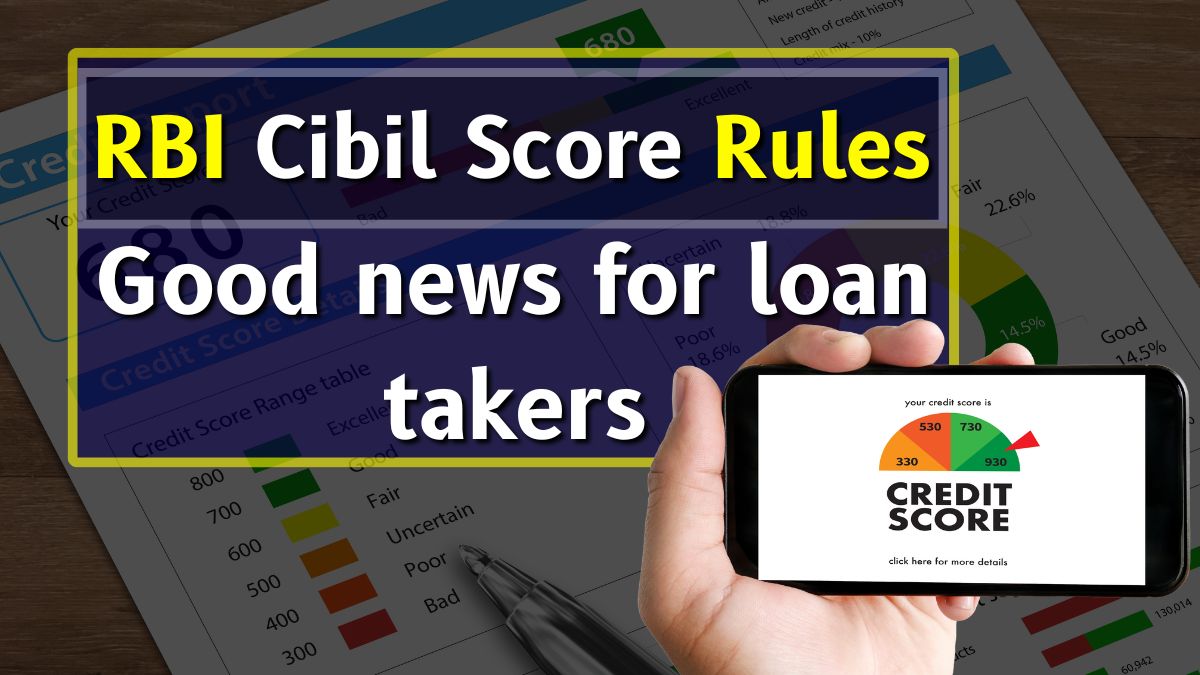RBI Cibil Score Rules: If you’re planning to take a home loan, personal loan, or car loan anytime soon, a major update from the Reserve Bank of India (RBI) could make things smoother for you. The RBI has announced plans to enable real-time updates of your CIBIL score, removing the long wait borrowers often face.
What’s Changing with CIBIL in 2025?
Until now, your CIBIL score — the three-digit number banks use to judge your creditworthiness — was only updated once every 15 days. This delay meant that even after paying off a loan or clearing dues, your credit report would not reflect the change immediately.
Under the RBI’s new plan, CIBIL scores will be updated in real-time, allowing both banks and customers to view the most accurate, up-to-date credit status instantly.
Why Is the RBI Doing This?
This move isn’t just about speeding things up. According to RBI, the goals are:
- More accurate credit reporting
- Better transparency between borrowers and lenders
- Faster loan processing
- Fewer errors in customer credit records
RBI is also pushing credit information companies (CICs) like CIBIL to improve how they share and process data.
“Trust, transparency, and efficiency are the backbone of a strong credit system,” said RBI Deputy Governor M. Rajeshwar Rao.
What Is a CIBIL Score, and Why Does It Matter?
Think of your CIBIL score as your financial reputation. It’s a number between 300 and 900 that reflects your:
- Loan repayment history
- Credit card usage
- Defaults, late payments, or EMI delays
- Credit limit utilization
The higher your score, the more likely you are to get a loan with better interest rates. A score of 750+ is usually considered excellent.
| Factor | Impact on Score |
|---|---|
| Timely EMI payments | Positive |
| Late or missed payments | Negative |
| Credit card overuse | Negative |
| Low credit utilization | Positive |
| Long credit history | Positive |
Why Real-Time Updates Are a Big Deal
Let’s say you’ve just paid off a big personal loan. With the old system, you had to wait 10–15 days for your score to reflect the change. That delay could cost you another loan, credit card, or even a lower interest rate.
With real-time score updates, here’s what changes:
- Your score reflects improvements immediately
- Loan approvals become faster
- You can track and improve your credit score more actively
- Fewer errors or outdated records in your credit report
RBI’s Other Major Steps
RBI isn’t stopping at real-time updates. It has also directed banks and NBFCs to:
- Educate borrowers about how credit scores work
- Simplify the reporting system through better technology
- Assign unique customer IDs to prevent mix-ups
- Make credit systems more user-friendly and transparent
This could reduce confusion and help people take control of their financial identity.
Is This Good News for You?
- You’ve recently improved your repayment habits
- You plan to take a loan soon
- You’re actively trying to build or rebuild your credit score
- You’ve been denied credit because of outdated CIBIL data
With better, real-time data, you’ll no longer be stuck explaining old records or delays that weren’t your fault.
Mistakes to Avoid While Building Credit
While this update is a step forward, customers also need to avoid common missteps:
- Don’t miss EMIs, even by a few days
- Avoid using over 50% of your credit card limit
- Never ignore your credit report—check it at least twice a year
- Don’t assume CIBIL will fix errors automatically—you must raise disputes
Frequently Asked Questions (FAQs)
Q: When will real-time CIBIL updates start?
RBI has not confirmed an exact launch date, but the system is under development and expected soon.
Q: Will this apply to all types of loans?
Yes. Home loans, personal loans, vehicle loans, and even credit cards will reflect in real-time once the system is live.
Q: Can I still check my CIBIL score for free?
Yes. You’re entitled to one free CIBIL report every year. You can request it directly from their official website.
Q: Does UPI spending affect CIBIL score?
No. Normal digital spending like UPI or Ola/Uber payments do not impact your credit score — unless linked to a loan or EMI.
